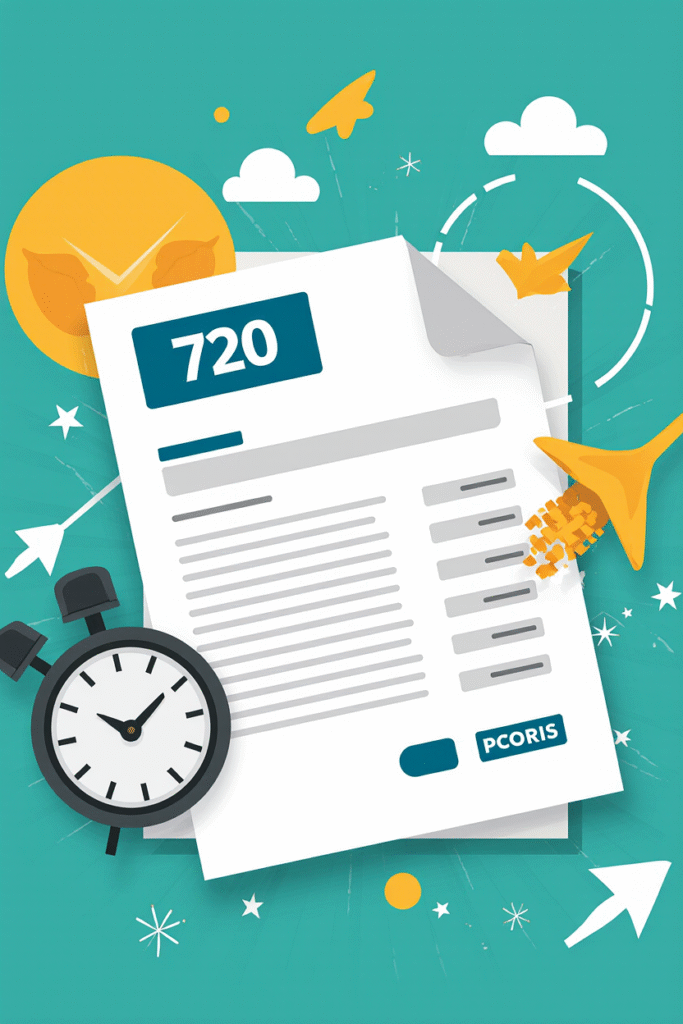Own a Business with an HRA? You’ve Got to File Form 720 on July 31
If you run your own business and offer a Health Reimbursement Arrangement (HRA)—like a 105-HRA, QSEHRA, or ICHRA—good on you. You’re helping your employees and taking advantage of some smart tax savings.
But there’s one small catch that trips up a lot of small business owners:
👉 You need to file IRS Form 720 and pay the PCORI fee every year.
It’s a minor cost (just $3.47 per covered life), but forgetting to file can bring unwanted IRS attention. The deadline this year is July 31, 2025 for plans that ended in 2024.

What’s the PCORI Fee—and Why Should You Care?
PCORI stands for Patient-Centered Outcomes Research Institute. To help fund it, the IRS requires certain health plans—like HRAs—to pay an annual fee.
If you have an HRA in place for any portion of the year, you’re likely responsible for filing Form 720 and paying the PCORI fee. This applies even if your HRA only covers you and your spouse.
Got an HRA? Then This Filing Applies to You
HRAs are amazing tax tools, but they come with this yearly to-do. You must file Form 720 if you use:
- A 105-HRA, especially in a spouse-only setup
- A QSEHRA, designed for small employers
- An ICHRA, which offers flexible coverage options for employees
Even if the HRA had no reimbursements during the year, filing is still required if the plan was active.
🔗 Want to know more about how HRAs work? Check out the official IRS page on HRAs.
HRA Types and What They Mean for Form 720
105-HRA: Yes, Even Spouse-Only Plans Must File
If your spouse is your only employee and you reimburse health expenses through a 105-HRA, this still counts. The IRS expects that PCORI fee—no exceptions.
QSEHRA: Small Teams, Big Responsibility
QSEHRAs are a great fit for businesses with under 50 employees. But if you offer one, you must report it on Form 720 each year—even with no claims filed.
ICHRA: Maximum Flexibility, Same Obligation
ICHRAs let your employees choose their own insurance. But they don’t exempt you from the PCORI fee. You’re still on the hook for filing.
How to File Form 720 for Your HRA
Here’s the good news: You can do it yourself, and it’s easier than it sounds.
- Download Form 720 from the IRS website.
- Fill out your business info on the first two pages.
- On Part II, Line 133, enter the average number of covered lives (you + spouse or any employees).
- Multiply that number by $3.47.
- Mail or e-file the form by July 31, 2025.
That’s it. No special software or accountant needed—just a little bit of your time.
Missed a Payment? Here’s What to Do
If you’ve missed a tax deadline—estimated or otherwise—don’t panic.
👉 Missed an estimated tax payment? Here’s how to handle it
It’s better to fix it now than deal with IRS notices later.
FAQ: PCORI Fee and HRA Filing
Is the PCORI fee tax-deductible?
Yes. It’s a business expense, so you can write it off.
What if I had no reimbursements this year?
Still file if the HRA plan existed—even if nothing was paid out.
Can I skip it this year and catch up next year?
Nope. Late filing can lead to penalties and IRS follow-up. Always better to file on time.
Final Thoughts: If You Have an HRA, Don’t Skip Form 720
HRAs—whether 105-HRA, QSEHRA, or ICHRA—are fantastic for saving money and offering health benefits. But don’t forget the small stuff.
Here’s your checklist:
✅ Have an HRA plan in 2024?
✅ At least one person covered (even just a spouse)?
✅ Want to stay compliant and avoid penalties?
Then file IRS Form 720 and pay the PCORI fee by July 31, 2025.
It’s simple, affordable, and protects the great tax advantages your HRA provides.




